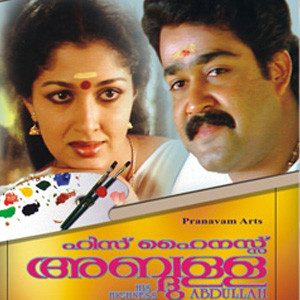 It was on March 30, 1990 that Kerala saw the release of His Highness Abdullah, a brilliant movie that brought with it a bunch of evergreen songs. This article is a (slightly belated) tribute to one of those songs on its 25th anniversary, one we consider to be among the best Malayalam songs ever composed – Pramadavanam. Well two articles actually, Praveen and I have shared our individual thoughts on the song. And for those who haven’t heard the song, the video is at the end of the write-ups.
It was on March 30, 1990 that Kerala saw the release of His Highness Abdullah, a brilliant movie that brought with it a bunch of evergreen songs. This article is a (slightly belated) tribute to one of those songs on its 25th anniversary, one we consider to be among the best Malayalam songs ever composed – Pramadavanam. Well two articles actually, Praveen and I have shared our individual thoughts on the song. And for those who haven’t heard the song, the video is at the end of the write-ups.
I don’t know when I first heard this song; it must have been on the small Philips radio we had, the one my mum used to hang on a nail on her kitchen shelf. Eventhough the movie was released in 1990 and both the film and music became huge hits, it was much later when I started to get the song. Malayalam film music is a tricky genre of music. During the 90’s and noughties it was pushed to the sidelines by A.R.Rahman and Bollywood. Having said that, I agree that there were always melodious songs in Malayalam. But as a kid growing up, I missed genuine “adipoli” songs in my mother-tongue. For that, I always had to look up to A.R.Rahman or Indie Pop.
So what I am trying to say is that Malayalam film music warms up to you only when you are ready to accept it with it flaws and shortcomings. What it lacked in the production quality and the latest tech, it tried to make up through sheer talent. As a teenager, I was not able to appreciate any of these things. And it must have been during my engineering college days that I gave it a serious listen. By then the cult of Raveendran had grown and everyone was re-listening his classic compositions. It is said that it was Raveendran who made Yesudas explore the lower vocal range of his voice. It was probably the only voice in which a mustachioed, no nonsense Malayali film hero can sing without making a fool of himself. It was Yesudas who helped Ravindran gain a foothold in the industry and they shared a unique bond and have created numerous hits. But according to me if there was one song which defined their partnership it was Pramadavanam.
It is not a song you can hum. It is not an earworm. But it has a Wagnerian force which draws all your attention to itself. If you think about it, there are various reasons for this, apart from the most obvious ingredient, the vocals, it is how Raveendran has used the violins which give this song that theatrical effect, that operatic quality. Here the violins don’t follow the vocals note by note as you would hear in a Carnatic recital, but instead takes a slightly different route. It matches Yesudas’s vocals in its grandeur and lifts both these elements to a different plane, the rest of the instruments come and go like the supporting cast in a play. In some sense this is a multi-dimensional fusion piece, you have a majestic Hindustani Raga, Jog sung with all the purity in a South Indian language. You have instruments of a carnatic kutcheri like the flute and veena. And then you have the violins played in what is essentially the western style.
Pramadavanam was the product of two people at the height of their powers. One was a composer who was among the finest, but didn’t get the kind of recognition he deserved while he was alive. The other one is a living legend and purely in terms of singing prowess arguably the best playback singer this country. When you think of the entire oeuvre of Malayalam film music, Pramadavanam occupies pride of place, something what the Stairway to Heaven enjoys in the annals of Rock’n Roll.
If one were to track Raveendran Master’s career, one noticeable aspect (among many others) would be the pinnacle it touched in the early 90s. Sure, the man had given us quite a few soundtracks up until then, Thenum Vayambum in ‘81, Chiriyo Chiri in ’82, Sukhamo Devi in ’86 to name a few. But the level of prolificness displayed by Master in the first half of 90s was unmatched – a lot of the songs we tend to remember Raveendran by happened in that timespan – and it pretty much started with His Highness Abdullah.
HHA was a musical landmark in more ways than one. The team of Sibi Malayil-AK Lohithadas was developing into quite a formidable one, not just in terms of their movies, but also the music they had. In Kireedom, Dasharatham and Mudra had already featured good music featuring three different composers, even winning a state award for MG Sreekumar in the process. But in HHA they would team up with Raveendran for the first time, a partnership that would yield four top-notch soundtracks, three national awards (Two for singing, one for composing) and one state award (one of only two State awards Raveendran ever won). Then there was the onscreen aspect. Mohanlal had been growing in stature already with each movie, but this movie would stamp his authority in play-acting classical songs, along with Nedumudi Venu, an ability few others have been able to match. Of course, both of them had done that in the past too (Chithram for instance), but this was much more “hardcore”, for want of a better word. And though the National Award committee saw it fit to give the best singer award that year to MG Sreekumar for Naadaroopini, and though it was Devasabhaathalam that had all the makings of being the tour de force with its fiery Carnatic-Hindustani duel, the song that would end up the true winner from the movie was Pramadavanam.
There are few composers who employed a raaga as sincerely and purely like Raveendran did, even when his songs did not go the whole hog and become entirely Carnatic (basically belonging to that genre Malayalis love to call semi-classical). In this movie, given the protagonist’s background, most of the songs featuring him had a Hindustani touch to them. And for Pramadavanam the composer chose the majestic raag jog. A raaga that was a perfect fit for the gravitas surrounding the song. The gravitas that derived a lot from the lines by Kaithapram Damodaran Namboodhiri, a man who had proven his way with heavy-duty verse right at his debut (Devadhundhubhi, 1986). And of course the delivery by the man who had by then attained beyond legendary status in the minds of Malayalis, Yesudas. A man who shared a special relationship with the composer – Yesudas reportedly brought Raveendran to Malayalam film music, and Raveendran in turn gifted Yesudas some of his most challenging songs this side of 80s. Each of which he handled with astounding finesse, much like this song. You hear it and you know that nobody else can render it to the same effect. Then there were the violins that were practically a second voice in the song. (An interesting observation/useless trivia at this point: Pramadavanam starts with an alaap by Yesudas, followed by a frenetic strings piece that accompanies the heroine’s excited run onscreen towards the hero after hearing the alaap. Years later, Raveendran reprised the act in another legendary song, Harimuraleeravam. Yesudas does an alaap (also portrayed by Lal, incidentally), and the strings section goes crazy while Manju Warrier does a similar run. The scene itself might have been a tribute for all I know.) The mridangam, that majestically breaks across those brief moment of silence. The veena and the flute that came and went during the interludes, imparting their momentary company to the violins. Given that there was no practice in Malayalam of crediting the additional musicians (still isn’t to a great extent, and not just in Malayalam, across industries), we might never know who the people behind each of these elements were, but there is no understating their role in making this song the cult it became.
Times have changed. Malayalam cinema, and music have changed too. We have pretty much moved on from those classical-rich musical movie formula, and the occasional attempts haven’t worked out well (last one I can remember is Meghatheertham. Had good music from Sharath, but the movie bombed). Not that I am complaining, in fact I quite like what the current generation of Malayalam composers are doing. But there are times when I wish time turned back to the March 30, 1990 and I heard this song (and a lot of others after this) for the first time yet again, this time with enough musical sense to be able to appreciate the greatness of the composition right then.






